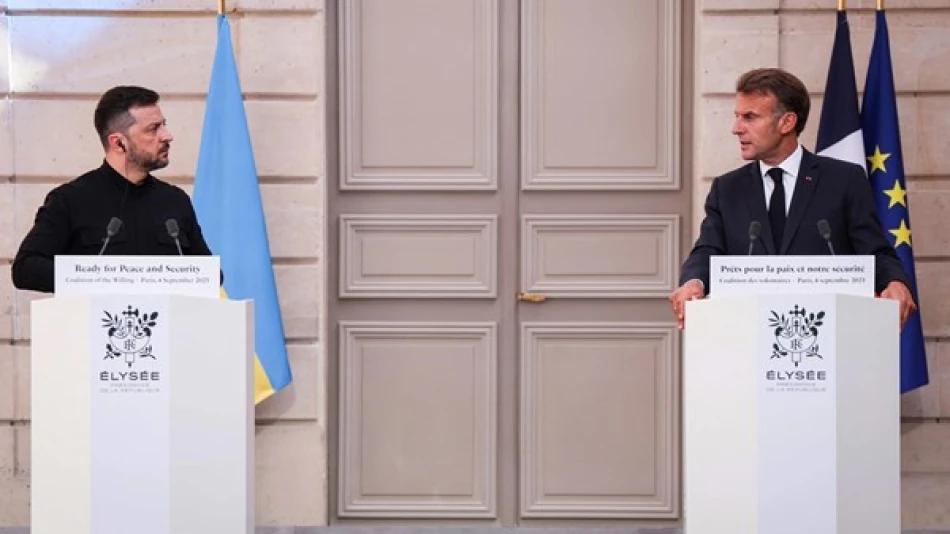
Macron: 26 Nations Commit to Joint Force for Ukraine's Defense
Europe Secures 26-Nation Commitment for Ukraine Security Force as Trump Era Begins
A coalition of 26 countries has committed to deploying forces in Ukraine across land, sea, and air operations as part of comprehensive security guarantees for Kyiv, French President Emmanuel Macron announced following high-stakes talks in Paris. The commitment comes as European leaders scramble to lock in concrete U.S. support under the Trump administration, with America expected to finalize its security guarantee framework within days.
Strategic Timing Amid Political Transition
The Paris summit of the "Coalition of the Willing" — Ukraine's primary military supporters — represents a critical diplomatic moment as European allies seek clarity on America's role under President Donald Trump. Meeting with approximately 35 world leaders, Macron positioned the gathering as an opportunity to "finalize robust security guarantees" for Ukraine ahead of any potential peace negotiations with Moscow.
Ukrainian President Volodymyr Zelenskyy's meeting with Steve Witkoff, Trump's special envoy, signals Washington's continued engagement in shaping Ukraine's post-conflict security architecture. "We have an understanding of the general framework for security guarantees," Zelenskyy stated, suggesting substantive progress beyond diplomatic pleasantries.
Multi-Domain Force Structure Takes Shape
The 26-nation commitment encompasses comprehensive military capabilities spanning ground, naval, and air operations — a significant escalation from previous support models focused primarily on weapons deliveries and training missions. This approach mirrors successful peacekeeping deployments in the Balkans during the 1990s, where sustained international presence helped cement fragile peace agreements.
The coalition extends beyond NATO's European core, incorporating Canada, Australia, and Japan — indicating broader democratic alignment on containing Russian expansion. This geographic diversity strengthens the mission's legitimacy while distributing operational burdens across multiple defense establishments.
Economic and Strategic Implications
For defense contractors and military suppliers, the multi-national force structure promises sustained revenue streams extending well beyond current conflict timelines. Unlike temporary weapons transfers, peacekeeping deployments typically require decades-long commitments involving logistics, maintenance, and personnel rotation — creating predictable demand for defense industries across participating nations.
The security guarantee framework also addresses a fundamental challenge facing international investors and reconstruction efforts: long-term stability assurance. Without credible security commitments, Ukraine's post-war economic recovery would face significant headwinds as businesses and financial institutions demand risk mitigation before major investments.
Pressure Tactics and Diplomatic Leverage
Macron's warning of "new sanctions against Russia in coordination with the United States" if peace talks fail represents a coordinated pressure campaign designed to bring Moscow to negotiations from a position of weakness. This approach leverages both military deterrence through the security guarantees and economic coercion through enhanced sanctions.
The timing suggests European leaders are working to present Trump with a comprehensive, multilateral framework that reduces American burden-sharing while maintaining Western strategic objectives. By securing 26-nation commitments before finalizing U.S. terms, European allies demonstrate their willingness to shoulder primary responsibility for Ukraine's long-term security.
Historical Precedent and Long-term Viability
The proposed security architecture resembles successful models from Germany's post-war integration and South Korea's defense arrangements — both requiring sustained international commitment spanning multiple decades. However, unlike those Cold War precedents, the Ukraine framework must navigate more complex geopolitical dynamics, including potential future shifts in American foreign policy and varying European threat perceptions.
The coalition's success will ultimately depend on maintaining political consensus across diverse democratic systems with different electoral cycles and strategic priorities. Early commitment from 26 nations provides encouraging momentum, but translating diplomatic pledges into operational deployments will test alliance cohesion under inevitable future pressures.
Most Viewed News

 Layla Al Mansoori
Layla Al Mansoori






